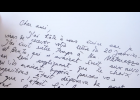Isabel Löfgren
Isabel Löfgren is Swedish-Brazilin artist, educator and researcher and a Senior Lecturer in Media and Communication Studies at Södertörn University, Sweden. She has a PhD in Philosophy, Art and Critical Thought from the European Graduate School in Switzerland. In the past decade, she has been mainly working with engaging media philosophy and media infrastructures with urban, visual and networked cultures mainly using phenomenological, feminist, and decolonial theoretical frameworks. Her book “Satellite Lifelines: Art, Media, Migration and the Crisis of Hospitality in Divided Cities” (2020, Institute of Network Cultures, Amsterdam) is largely based on Flusser’s philosophy of exile and television in the framework of a philosophy of media hospitality as it plays out in media usage and diasporic communities in segregated cities.
Articles of Isabel Löfgren
From Ecstasy to Melancholy: An epistolary journey recounting Flusser’s unrealized proposal for the Art & Communication nucleus in the 1973 XII Bienal de São Paulo
This essay presents a brief commentary about Vilém Flusser’s activity as a technical advisor for the 1973 XII Bienal de São Paulo through an archive of unpublished correspondences. This archive reveals Flusser’s persona as a prolific letter writer and gives us a glimpse on his attempt to turn “theory into praxis” by articulating a complex and forward-looking communicological proposition to reorganise the Bienal in line with developments in new media art practices and telecommunications infrastructures at the time. The aim was to critique notions of art display, spectatorship and production, through a utopian, radical, and collective laboratory with artists using communicative practices. Most of the letters were written between 1971-1973 while Flusser was working in Europe, in part to garner international approval and participation for the event. The correspondences also testify to a period of inflection in Flusser’s approach to the visual arts and for the ambitious outlook on artistic practices and their discursive potential for social and political transformation. I suggest that Flusser has used a curatorial approach as a means to embed his philosophy in everyday life through the medium of the art exhibition. Flusser’s work was cut short due to funding issues and other contingencies before the proposition could be fully realized, leading ultimately to his permanent second exile in Europe in late 1973.

